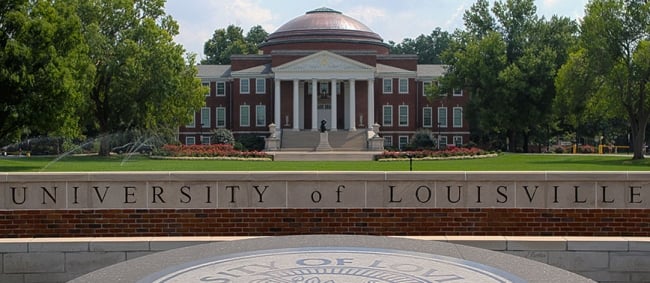You have /5 articles left.
Sign up for a free account or log in.

Contract guarantees for University of Louisville vice presidents are drawing scrutiny.
University of Louisville
A new report on operations at the University of Louisville Foundation describes in devastating detail a series of excessive spending practices, unbudgeted expenses, unapproved actions, high executive compensation and unrecorded endowment losses.
The foundation’s Board of Directors in many cases did not approve foundation activities or were not aware of them, according to the 135-page report, which was produced by an independent investigating firm and released Thursday. Foundation officers often did not provide board members with enough information to allow them to make informed decisions, it said. The foundation mixed its pots of cash, leaving it unable to identify funding sources for particular transactions and scrambling its endowment valuation. Foundation employees in some cases sought to hide their actions from the media.
Leaders at the University of Louisville and its foundation generally refrained from commenting in depth Thursday, when they reviewed the report for the first time. It “paints a disturbing picture,” said the chairman of the university’s Board of Trustees, J. David Grissom, in a statement. He did not rule out legal action in the future.
“The board has not yet determined what legal actions, if any, should be taken as a result of the forensic investigation conclusions,” Grissom said. “However, I would anticipate that the board, after consulting with counsel, will, within the next couple of weeks, make that determination.”
The report has been hotly anticipated since it was ordered last year in the wake of the ouster of James Ramsey, who was president of both the university and the foundation. Ramsey’s leadership had come under intense scrutiny and political pressure before he stepped down from the role of university president last summer, leaving a role he had held for 14 years. He later resigned from the foundation presidency.
The foundation receives and administers donations for the University of Louisville. It manages an endowment reported to be worth more than $700 million as of the 2016 fiscal year. It is made up of 13 wholly owned subsidiaries and several joint-venture partnerships.
The university hired the consulting firm Alvarez & Marsal to conduct the examination amid major questions about foundation spending. The report focuses on the time period spanning the 2014 to 2016 fiscal years. In doing so it examines some decisions dating back to the early 2000s.
Specific Findings
According to the report, the foundation made loans to its subsidiaries and reported the balance of those loans in its endowment pool -- even though the subsidiaries appeared to not be able or not to be required to repay those balances.
For instance, the foundation loaned a subsidiary $10 million in endowment funds for a grant without approval from its Board of Directors. The grant does not represent an asset, but its principal amount plus interest have been listed as an endowment pool asset. That means the university overstated the endowment pool’s market value by $11.2 million. In another case, a similar series of loans that was approved by directors led to the endowment pool market value being potentially overstated by more than $60 million.
Investments in high-risk start-up companies are also examined. The foundation invested $9.9 million from its endowment pool into companies now valued at less than $2 million. The foundation also guaranteed loans and other benefits, likely costing $3.2 million more in losses. Documents showed at least one company was required to rent space from a foundation subsidiary in exchange for a $3.2 million investment. It appears some companies funded research through donations instead of research sponsorship agreements so that they could avoid paying university overhead charges.
Those and other issues have contributed to the foundation spending far more than is called for in its endowment spending policy. Its policy is to spend 7.48 percent of its endowment’s three-year average market value annually. But the report finds effective spending rates as high as 15.14 percent in 2014, 10.99 percent in 2015 and 14.64 percent in 2016.
In December 2004, the foundation board authorized Ramsey to spend $5 million over five years from an undesignated quasi endowment that at the time was valued at about $17.6 million. Directors removed the time restriction and, apparently, the amount restriction in 2007. The fund was entirely spent by the end of March 2014. Some spending went to executive compensation and bowl game trips. They did not appear to have been in accord with board authorization, the report found.
The foundation and the University of Louisville Athletic Association did deals in which the foundation purchased properties for the athletic association or funded expenditures for it. In return, the athletic association waived required donations for tickets to men’s basketball games and football games. It also transferred cash to the university.
The foundation spent $15.1 million for the athletic association, including $4 million for former football coach Steven Kragthorpe, as part of a coaching staff reorganization. The foundation received only $11.6 million in consideration in return.
The foundation funded $4.9 million in compensation for a group of athletic association employees between 2010 and 2016. That included $1.8 million in compensation to Athletic Director Tom Jurich under an employment agreement with the foundation.
Deferred compensation the foundation awarded to Jurich and men’s head basketball coach Rick Pitino exceeded the market value of funds designated for the payments. Money set aside for the compensation awards was recorded as accruing interest at a rate greater than average market returns, the report found.
The foundation funded $800,000 in season tickets every fiscal year for the Office of the President. The office was to give the majority of tickets to donors and alumni. It also sold a small number of the tickets it held. The tickets would have required a total donation of $18.6 million over 10 years under normal circumstances. But the athletic association agreed to waive $9.6 million in exchange for the foundation financing four special projects costing $8.5 million.
Other events scrutinized related to athletics included the foundation liquidating endowment assets to fund a loan to purchase a golf course. The course’s owner was considering selling, and the university’s golf team played at the course. The athletic association was concerned the golf teams would not have a place to play. The foundation used endowment assets to fund a loan to purchase the course but did not list the loan as an endowment pool asset in its accounting. It also changed an interest rate below returns it would have expected to earn if the funds remained in the endowment pool, according to the report.
The foundation’s Board of Directors does not appear to have been informed of all property acquisitions for the athletic association, the report says. It also cites documents from a foundation official attempting to conceal the relationship between the foundation and association.
One 2012 letter from Kathleen Smith, who was chief of staff for the president and assistant secretary, says, “This note is between you, Tom [Jurich], Dr. Ramsey and me. I do not want it on the email where we have very little control. Please destroy your earlier note to me. I have done same here.”
The letter was a part of negotiations between the athletic association and the foundation that resulted in the athletic association using properties in exchange for transferring $2 million to the University of Louisville in order to fund university faculty and staff salary increases.
Officials also showed interest in concealing from open records requests compensation the foundation paid, according to the report. It cites one email between Smith and David Saffer, a lawyer, in which Smith discusses taking the vowels out of the name of a foundation subsidiary that administered deferred compensation plans until 2014.
“Thought taking the vowels out of Minerva could work too,” the email said. “I’m fine with either but needs to be difficult to figure out for media.”
The report also found that the foundation paid out compensation beyond budgeted amounts its Board of Directors approved and that additional compensation was not transparent. It found the Office of the President directed the foundation to not include deferred compensation from the foundation budget.
From 2005 to 2016, the deferred compensation plan cost the foundation $21.8 million -- $8.4 million in vested contributions, $4.1 million in accrued earnings and $9.2 million in tax gross-ups, which are reimbursements for taxes paid on income. Foundation officers worked to conceal the compensation from open-records requests. Contributions and earnings of $12.5 million went to just nine employees.
The foundation purchased properties at prices above appraised value. It paid $10.3 million above value for eight properties. It paid a total of $30.1 million for properties not generating revenue. In some cases the foundation’s Board of Directors also approved property acquisitions without identifying the source of funding used.
Unbudgeted and overbudgeted expenditures led to the foundation liquidating $42 million of its endowment pool assets. Foundation spending resulted in underwater endowments -- restricted endowment programs with a current market value below the size of the initial gift -- reported at $23.7 million as of June 30, 2016.
Consultants gathering information for the report found that the university did not always preserve data. In one instance, the university’s IT department erased and repurposed Ramsey’s hard drive before the consultants began their investigation.
The Office of the President made procurement card purchases that may not be in compliance with university policies, the report said. A January 2017 compliance review identified several cases where employees used procurement cards for personal expenses, including home internet service and personal meals.
Diane Medley, the foundation’s chair, released a statement that did not comment on the report specifically.
“I am going to take some time to digest what I’ve read before making substantive comments about the findings,” Medley said. “But I would point to the myriad changes we have undertaken at the foundation over the last few months as evidence that things have already changed for the better, particularly in terms of governance, financial management and overall transparency. Along with the new board and the foundation’s executive director, Keith Sherman, we as a team have worked hard to get this foundation back to a place where it can fulfill its vital work -- to support the academic mission of the University of Louisville.”
Distancing Itself From the Past
The university has sought to distance itself from Ramsey’s leadership. Representatives on Thursday described the audit as a “retrospective on how the University of Louisville Foundation operated under previous leadership.” The university’s interim president, Greg Postel, sent an email on Wednesday, before the report was released, spelling out numerous changes put in place over the last eight months.
Those changes include governance reforms like prohibiting the same person from serving as president of the university and its foundation. They also include the foundation complying with Kentucky’s open-records law, establishing a line-item budget and appointing 12 new members to the foundation’s 15-person board.
“The audit should help us close the door on the previous chapter for both the university and the foundation,” Postel’s message said.
Other changes that have been put in place include the foundation hiring a full-time executive director and chief operating officer, holding board meetings monthly instead of quarterly, and putting in place a memorandum of understanding between the foundation and the university to define their individual roles.
Additional reforms were geared toward added spending oversight and public transparency. The foundation has also killed its controversial deferred compensation program, which provided about $20 million to a small group of administrators.
Postel released a statement on the audit Thursday.
“As I have said since I took this position in January, I am committed to being transparent and to operating above the board,” he said. “I also am committed -- and I think our recent actions confirm this -- to returning this university to solid financial footing. The steps we are currently taking will position us well for the future.”
Ramsey's lawyer, Steve Pence, told The Courier-Journal that he could not comment until he read the report. The report says that Ramsey declined to be interviewed in person by investigators, as did eight of 18 former foundation board members.
The forensic audit comes after a report released in December by Kentucky’s Auditor of Public Accounts found fault with the foundation’s governance and relationship to the university. That report found a concentration of authority had caused ineffective governance practices, as well as a lack of checks and balances. It also noted representatives of the Auditor of Public Accounts office were not able to consistently access information until new leaders were put in place at the university and the foundation.




